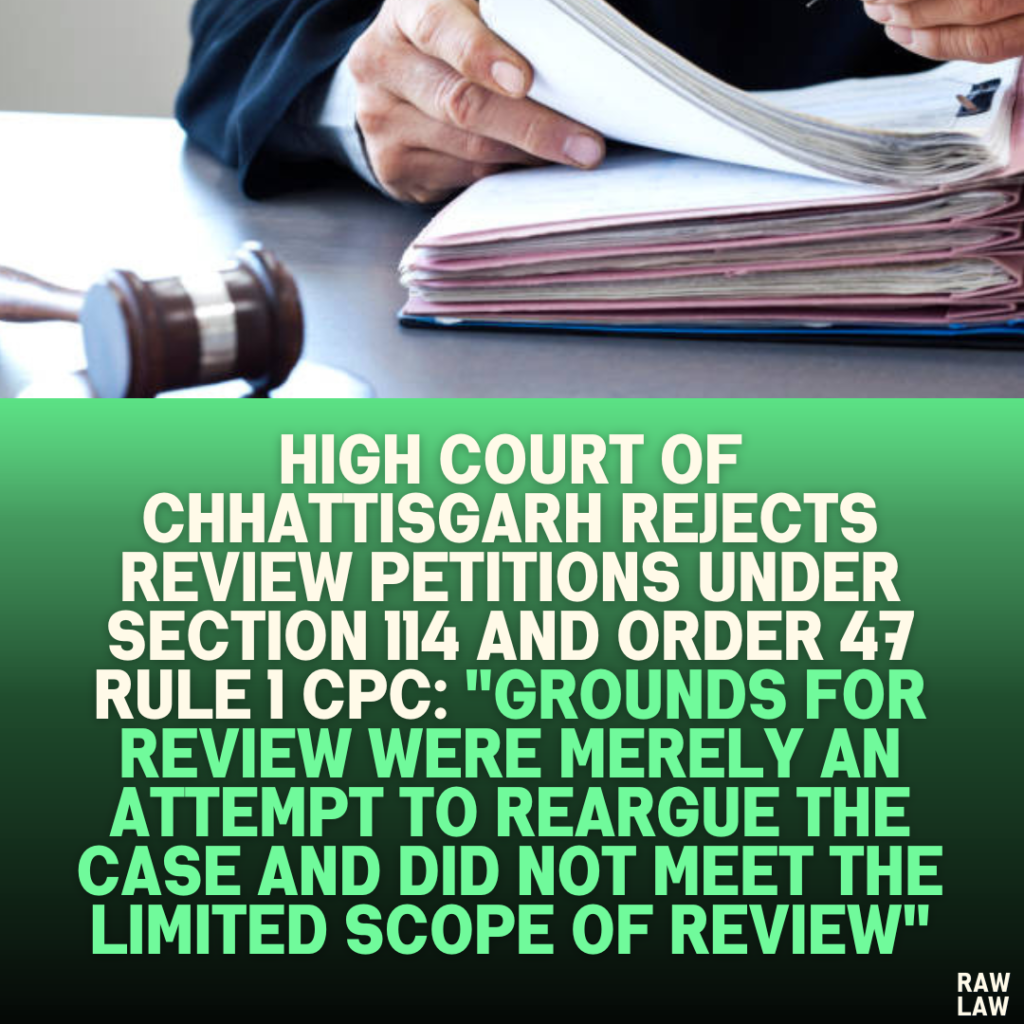Court’s Decision
The High Court of Chhattisgarh, presided over by Justice Rakesh Mohan Pandey, dismissed two review petitions filed by the State of Chhattisgarh. These petitions sought to challenge the court’s earlier decision in two writ petitions, which had set aside the termination orders of several Auxiliary Nurse Midwives (ANMs). The court ruled that the grounds for review were merely an attempt to reargue the case and did not meet the stringent requirements for review under Section 114 and Order 47 Rule 1 of the Civil Procedure Code (CPC).
The court held that:
- No error of law apparent on the face of the record was demonstrated.
- A review petition cannot be used as a disguised appeal to reargue or overturn a judicial decision.
- Procedural fairness must be maintained even for probationary employees.
Facts
The case arose from the termination of several ANMs employed by the State of Chhattisgarh. These employees were initially appointed on a probationary basis for two years. During this period, the State terminated their services, citing excess appointments due to a mistake in the calculation of sanctioned posts. The termination orders relied on clauses in the appointment letters, stating:
- The appointments were temporary.
- The State could terminate services with one month’s notice or pay in lieu.
- Appointments made due to errors could be rescinded.
The writ petitioners challenged their termination, arguing that they were appointed against sanctioned posts through a merit-based process conducted by VYAPAM (Chhattisgarh Professional Examination Board). They contended that their termination violated principles of natural justice, as no inquiry was conducted, and no opportunity for a hearing was provided.
On November 28, 2023, the High Court ruled in favor of the writ petitioners, quashing the termination orders and directing the State to act in accordance with the law.
The State subsequently filed review petitions, arguing that critical facts supporting the termination decision had not been adequately presented in the original writ proceedings.
Issues
- Did the grounds raised in the review petitions justify reopening the court’s earlier decision?
- Was the termination of probationary employees lawful and procedurally fair?
Petitioner’s Arguments
The State of Chhattisgarh raised the following points in the review petitions:
- The writ petitioners were probationary employees and not entitled to the procedural safeguards applicable to regular employees under the Chhattisgarh Civil Services Rules.
- The termination orders were valid under clauses in the appointment letters permitting rescission of erroneous appointments.
- Financial and administrative difficulties would arise if the court’s original decision were allowed to stand, as it could prompt similar claims from other employees.
The petitioners argued that these points had not been adequately considered in the earlier proceedings.
Respondent’s Arguments
The writ petitioners, represented by their counsel, opposed the review petitions on the following grounds:
- Their appointments were made against sanctioned posts after a rigorous merit-based selection process, and they were entitled to procedural fairness.
- Their termination violated principles of natural justice, as no inquiry was conducted, and no reasons were provided for their removal.
- The grounds raised in the review petitions were not part of the State’s pleadings in the original writ proceedings, and review cannot be used to introduce new arguments.
Analysis of the Law
The court analyzed the scope of review under Section 114 and Order 47 Rule 1 of the CPC, which provides that a review can only be granted on the following grounds:
- Discovery of new and important evidence that could not have been presented earlier despite due diligence.
- Mistake or error apparent on the face of the record.
- Any other sufficient reason.
The court emphasized that review petitions are not a substitute for appeals. A review is permissible only for errors that are self-evident and do not require detailed reasoning or reappraisal of evidence.
The court relied on several precedents to underscore these principles:
- Northern India Ltd. v. Lt. Governor of Delhi (1980): Review petitions cannot be used as a second attempt to argue a case unless the original decision is “manifestly distorted.”
- Parison Devi v. Sumitri Devi (1997): Errors that require elaborate reasoning to detect are not grounds for review.
- Shanti Conductors (P) Ltd. v. Assam State Electricity Board (2020): Review petitions cannot be disguised appeals.
- Sajjan Singh v. State of Rajasthan (1965): A judgment cannot be reviewed simply to seek a fresh decision.
Precedent Analysis
The court applied the above principles to the present case and noted:
- The grounds raised in the review petitions were not new evidence but arguments that could have been raised in the original writ proceedings.
- No error of law or fact apparent on the face of the record was demonstrated.
- Allowing the review would undermine the finality of judicial decisions and encourage litigants to misuse review proceedings as a second bite at the cherry.
Court’s Reasoning
The court concluded that:
- The State’s arguments for review were an attempt to reargue matters already decided.
- The termination orders were quashed in the original writ proceedings because they violated principles of natural justice, a finding that remained unchallenged on appeal.
- Procedural fairness must be upheld even for probationary employees, particularly where appointments are made against sanctioned posts.
Conclusion
The court dismissed the review petitions, holding that no grounds for review had been established. It reaffirmed the finality of its original decision and emphasized the limited scope of review under the CPC.
Implications
This judgment reinforces the principle that review petitions are not an opportunity to reargue a case but are limited to addressing errors apparent on the face of the record. It upholds the importance of procedural fairness in employment matters, even for probationary employees, and serves as a cautionary precedent against misuse of review proceedings.
